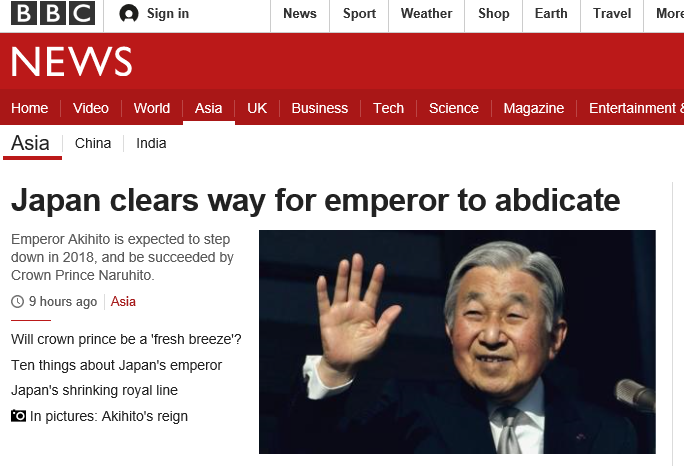※2019.7.20 追記
1970年の今日11月25日、三島由紀夫が市ヶ谷の自衛隊で自決した。彼の遺志を酌み、今日は皇室にまつわる英語表現を学ぼう。
グローバル化する世界において、今後、天皇にスポットライトが当たる機会が増えるかもしれない。天皇こそは日本が日本たる所以であり、グローバリストや新自由主義者の好きな「ブランド」、「価値」、「差別化」などの諸概念を一身に具現化しているお方だからだ。

以下、本稿では次のNikkei Asian Review記事から適宜引用させてもらう。
“Japan’s emperor opts for abdication”
退位特例法:special/one-time abdication law
ところが皮肉なことに今上陛下はリベラルな考えをなさる方で、そうしたことはあまり気にされない。むしろ象徴としての天皇のあり方をめぐるご発言が、男系世襲を含め皇室伝統を重んじたい安倍政権にとって面倒な事態を招いてしまった。窮余の策として特例法でご退位を容認することになったのはみなさんご存知の通りである。
The bill is designed to enable the abdication as a one-off, exceptional case without changing the basic framework for Imperial succession.
「特例法は皇位継承の基本的枠組みを崩すことなく、一世限りの特例措置として設計されている。」
退位するは “abdicate”。特例法は文脈が明らかなので単に “the bill” と表現できる。皇位継承は “Imperial succession” という。
特例法の意図について次のような事情を伝えている。
Emperor Akihito reportedly expected that the debate on his retirement would also cover such related issues as possible expansion of the role of women in the Imperial family. But the government of Prime Minister Shinzo Abe, which feared that touching on such issues could shake the traditional Japanese view of the nation, maneuvered to ensure an early conclusion of the debate without seeking any fundamental reform of the Imperial household system.
「陛下は皇室における女性皇族の役割拡大を含めてご自身の退位を検討してほしいとの希望を持たれていたと伝わるが、安倍政権はそのような検討が伝統的な国家観を揺るがしかねないとの懸念から議論を早々に切り上げた。これにより皇室制度の基本改革に手を付けずに済むからである。」
この文脈で “伝統的な国家観” とは日本が天皇の男系継承を維持してきた伝統を指す。”女性皇族の役割拡大” が、女性による皇位継承を含意するものであれば、確かに伝統に抵触する。”the traditional Japanese view of the nation” という英語表現はまどろっこしい。単に “tradition” でよいと思う。
皇族は ” the Imperial family”、皇室は “the Imperial household”、皇室制度は “the Imperial household system” という。
孤独な皇室
The emperor is different by nature from the constitutional monarchs of other countries that have royal families. It is impossible to understand Japan’s national character without comprehending this difference. The emperor was regarded as a living god until 1946.
「王家を持つ他の立憲君主国との違いがわからないと、日本の置かれている状況が理解できない。1946年まで天皇は現人神だったのである。」
明治以降日本は、君主が憲法の制約を受ける立憲君主国だ。立憲君主を “constitutional monarch” という。立憲君主制は “constitutional monarchy” という。これに対して憲法に制約されない絶対権力を付与された君主を絶対君主という。英語では “absolute monarch” だ。
“royal family” は例えばイギリスなら王家だが、日本では宮家と呼ぶ。現皇室には直系親族以外、宮家はない。孤独な皇室なのである。その一事だけでも “戦争責任” は十分果たされてきたように思うが、左側の人々は納得しないのだろう。
象徴天皇制は妥協案?
The emperor under the old Constitution was not only institutionally deified but also had enormous spiritual influence over the Japanese people. Douglas MacArthur, the commander of the U.S. Army forces in the Far East during World War II and supreme commander of the Allied powers during the postwar Allied Occupation of Japan, decided to indirectly rule Japan while maintaining the Imperial system instead of direct administration by U.S. forces.
There was heated debate among the Allied powers over whether the Imperial system should be abolished. The definition of the emperor as the national symbol was conceived as a political compromise to settle the issue.
「旧憲法(明治憲法)下で天皇は神格化され、国民精神に大きな影響を及ぼした。占領軍GHQのマッカーサー元帥は、直接占領統治せず、皇室制度を維持したまま間接統治する道を選んだ。」、「皇室廃絶の是非を巡っては連合国側で激しい議論があった。事態を収拾する妥協策として天皇を国民の象徴として定義したと言われている。」
This does not mean, however, that the emperor as the national symbol is similar in nature or function to the British monarch, who “reigns but does not rule.” In contrast, the emperor was considered a descendant of the gods.
「象徴とは言っても、『君臨すれど統治せず』のイギリス国王とはその本質も機能も異なる。天皇は神々の末裔(神裔)なのだ。」
この説明には少々悪意が感じられる。”reign but not rule” は「君主はトップにはいるけど実際の政治行政は下の人に任せる」という意味で、立憲君主制のことを指す。まるで日本は立憲君主制でないという口ぶりではないか。天皇は象徴であって君主として規定されていない以上、厳密には立憲君主制ではないのだが、実際上は諸外国から国家元首と見なされている。このようなぎくしゃくを改憲派は正したいのだろう。
靖国問題
In 1978, the so-called Class A war criminals, wartime Japanese leaders who were convicted of serious war crimes in the International Military Tribunal for the Far East, known as the Tokyo Trials, were enshrined at the Yasukuni Shinto shrine in Tokyo together with other war dead. This move echoed the nationalist ethos of the traditionalist movement.
Akihito’s father, Hirohito, was infuriated at this attempt to exonerate Japan and stopped his regular pilgrimages to the shrine, which he had visited every five years. Emperor Akihito has never visited the shrine since he ascended the Chrysanthemum Throne.
「1978年、極東軍事裁判(東京裁判)でA級戦犯の有罪判決を受けた戦時指導者が靖国神社の戦没者に合祀された。合祀は国家主義者の復古運動的なエートスを反映したものといわれた。」、「昭和天皇は、日本を無罪放免化するものとしてこの行いに激怒し、五年に一度の公式参拝を取りやめた。今上陛下はご即位以来一度も靖国に参拝されていない。」
この文章はニュートラルではない。裕仁昭和天皇が親拝を中止されたのは事実だが、合祀に “激怒”(”infuriate” は強い表現)した事実は確認されていない。怒るというより「不快感を示された」とするのが一般的。この辺の事情についてはWilipediaの「富田メモ」の項を参照してほしい。今上陛下が一度も靖国に行かれていないのは事実。A級戦犯合祀問題はいまでも国際的な懸案事項。
“convict (someone) of (something)” で有罪判決を下すの意味。”enshrine” は(神として)祀る(祭る)の意味。”exonerate” の語源はラテン語の “ex“(out、off)+ “onerare“(load、oppress)、「重荷を外す」→「無罪化する、解放する」。派生語に “onerous”(面倒な、厄介な)。
“ascend the Chrysanthemum Throne” は即位するの定型表現。直訳すれば「菊の座(=玉座)に上がる」→「天皇の座に就く」の意。”the Chrysanthemum Throne” 単独で「菊のご紋(紋章)」「皇位」「天皇の地位」を意味する。
陛下の信条と安倍内閣との齟齬
Unlike his predecessor, whose status changed from living god to human being as a result of international politics, Akihito has always been the emperor as national symbol since his accession to the throne. People close to the emperor say Akihito thought he would not be able to serve as the symbol of “the unity of the People” if he relied only on the traditional authority of the emperor.
As a result, he has based his public service on two key principles since he ascended the throne in 1989. One is strictly adhering to the pacifist principles of the Constitution and, specifically, making as many trips as possible to console the spirits of war victims in countries where Japan fought in the war.
「国際政治に対応して現人神から人間原宣言で人間に帰られた昭和天皇と異なり、今上天皇昭仁は即位以来一貫して国の象徴としての天皇であられてきた。側近の伝えるところによれば、伝統的権威のみに立脚すれば、ご自身が『国民統合』の象徴として公務を務めることは叶わないとお考えになっている」、「1989年のご即位以来、二つの行動原理で公務を遂行されてきた。一つは憲法の平和精神に忠実に行動すること、特に日本が戦闘を行った諸外国を訪れ、戦争犠牲者を慰霊することである。」
記事では、このような今上天皇の姿勢(伝統的権威、あるいは戦時の神格化を否定し、もっぱら象徴天皇として行動すること)と、安倍内閣の天皇観(伝統宗教の天皇像を)が一致せず、今次のご退位問題を安倍内閣が「聞いていないことにしたかった」事情を推し量っている。微妙な問題なので、この記事の見解として受け流しておこう。
皇位継承問題の棚上げ
What does Abe intend to do to cope with this sticky question? The nation is facing a crucial choice concerning the issue of Imperial succession. Should it choose to restore former Imperial family members to their previous status in order to maintain an unbroken line of emperors that supposedly dates back to the gods? Or should it opt to allow succession in the female line in accordance with global trends?
Tackling this hugely complicated and politically fraught issue, requires a leader with considerable courage. Given the Japanese tendency to put off grappling with sticky challenges, this problem seems likely to remain untouched until the very last moment, perhaps when the Imperial line is about to die out.
「この厄介な問題に安倍内閣はどう対処しようとしているのか?皇位継承問題で国は重大な岐路に立たされる。神代に遡るとされる皇統を護るべく、皇籍離脱した宮家を皇族に復帰させるのか、それとも諸外国の慣例を採り入れ女系による皇位継承を認めるのか?」、「このように複雑高度な政治課題を解決しようと思えば、指導者には並々ならぬ勇気が要る。難題には直接対峙せず先送りする日本政治の慣習に従うなら、まさに皇統が絶えんとするその瞬間まで、この問題には触らない可能性が高い。」
これは確かにそうだろうと思わせる記述。皇位継承問題に取り組む内閣は容易に想像できない。とりわけ今上陛下と政治側の皇位に関する認識がズレている場合、解決は困難だ。
皇籍離脱は宮家が一般に降ることで戦後の言い方。以前は臣籍降下といった(参考:
臣籍降下)。英語では “demote (demotion) from nobility (to subject)”。”demote” は “promote” の反対語。
“crucial” はラテン語のcrux(十字架)に由来し、crossroadsにおけるチョイスを含意する。そこから「重大な、命運を左右する」という意味が派生している。”sticky challenges” はまとわりついてくる(絶えず懸案の)課題という意味。”sticky” は粘着が原意の便利なことば。ポストイットは商標名、一般名詞は “sticky note”、”sticky page marker” といえばポストイットのしおりのこと。また “sticky post” といえば、ホームページ上で(記事の更新とは無関係に)常に先頭に表示されるエントリーを指す。
三島の訴えたかったこと
三島由紀夫が一命を賭して訴えたかったことは何か?
以下の演説文を素直に読めば、なにがしかは伝わってくるだろう。あれからもう半世紀近くが経ち、日本はようやく憲法改正に踏み出そうかという時期に差し掛かっている。一年に一度くらいはこういうものを読んで、日本が置かれた状況を考えてみるのは悪いことではないと思う。
参考:三島由紀夫演説文
激のエッセンス(2019.7.20追記)
三島の激の一部を以下に引用する。
- 諸君は、去年の一〇・二一からあとだ、もはや憲法を守る軍隊になってしまったんだよ。
- 自衛隊にとって建軍の本義とはなんだ。日本を守ること。日本を守るとはなんだ。日本を守るとは、天皇を中心とする歴史と文化の伝統を守ることである。
- 諸君は武士だろう。武士ならば、自分を否定する憲法を、どうして守るんだ。
- 憲法というものは、ついに自衛隊というものは、憲法を守る軍隊になったのだということに、どうして気がつかんのだ!俺は諸君がそれを断つ日を、待ちに待ってたんだ。
- これで、俺の自衛隊に対する夢はなくなったんだ。それではここで、俺は、天皇陛下万歳を叫ぶ。
天皇陛下万歳! 天皇陛下万歳! 天皇陛下万歳!
平和を愛する諸国民の公正と信義に信頼して、われらの安全と生存を保持しようと決意した。







コメント